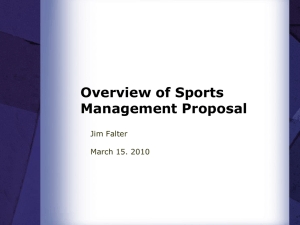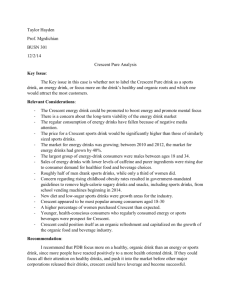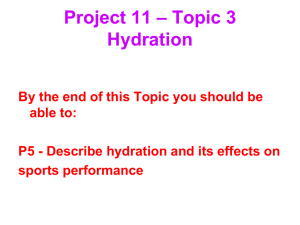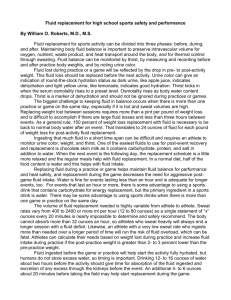Hydration Needs for the High School Athlete
advertisement
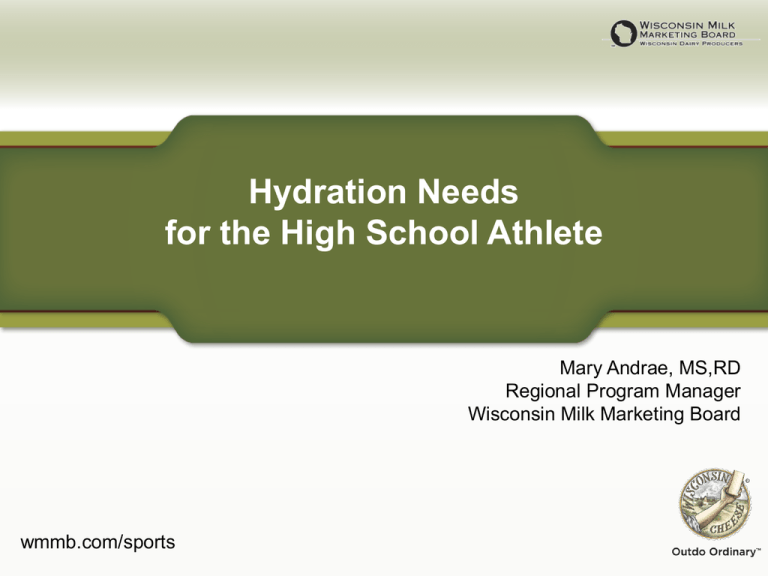
Hydration Needs for the High School Athlete Mary Andrae, MS,RD Regional Program Manager Wisconsin Milk Marketing Board wmmb.com/sports Breaking Down Hydration Focus on Hydration Dr. Gibson Hydration Consistency NUTRITION Timing wmmb.com/sports Nutrients Rethink Your Drink What drink choices do you have? wmmb.com/sports Energy Drinks What’s in an Energy Drink? • Caffeine • Sugar Energy Drinks Energy Drinks WIAA Performance Enhancing Substances The WIAA is against the use of anabolic-androgenic steroids and other performance enhancing substances (PES). DISCOURAGED--The WIAA identifies 'Restricted' substances. These restricted substances can be legally purchased, but are prohibited in connection with school programs. They include: Creatine, Caffeine-enhanced products, Energy drinks (e.g., Red Bull, Amp, Advance by PowerAde, Coke Blak), Herbal Caffeine, No Doz, Protein Powders and other substances as identified in the materials. http://www.wiaawi.org/Health/PerformanceEnhancingSubstances.aspx wmmb.com/sports Sports Drinks What’s in a Sports Drink? • Electrolytes • Sugar wmmb.com/sports Beverage Comparison wmmb.com/sports Stay Hydrated Before: • • • • • Drink fluids throughout the day 1st choice should be water Avoid soda and fruit drinks with little nutritional value Watch out for sweet coffee drinks Body absorbs fluid better with smaller amounts rather than all at once – drink throughout the day During: • Drink sports drinks only during INTENSE (1 hour or greater) exercise After: • Refuel with low-fat chocolate milk – the right mix of carbs and protein for recovery wmmb.com/sports Hydration Monitor If you are thirsty you are already dehydrated. Your fluid needs a minimum of ½ oz. per pound per day 120 lb. needs (60 oz. or minimum of 7.5 cups of fluid/day from all fluid sources) 8 oz. = 1 cup Example on how to focus on fluids • • • • • • 1.5 cups at breakfast (8 oz. milk plus 4 oz. juice) 1 cup water in the morning 1 cup with lunch (8 oz. of milk) 2 cups water in the afternoon (before and during practice) 1 cup with dinner (8 oz. of milk) 1 cup water in the evening wmmb.com/sports Hydration Monitor Checking urine is as simple as looking at the urine color http://www.cyfallssportsmedicine.com/heatawareness.html Dehydration Causes: • • • • • Early fatigue Increased heart rate Increased blood pressure Lowers your work capacity Impairs your skills wmmb.com/sports Hydration Musts Maintain hydration Maintain electrolytes (calcium, potassium, sodium and magnesium) 5-12 oz. every 15-20 minutes (1 gulp = 1 oz.) Thirst is NOT a good guide wmmb.com/sports What Should an Athlete Drink After Training? The goal of recovery is to return to the pre-training performance baseline Immediately: Chocolate milk within 20-60 minutes post activity • Liquid fluid source is ideal for immediate recovery • Repletion of fluid losses is also essential (for every pound lost replace with 16-24 oz. fluid) • Carbs for: • Glycogen replenishment in liver and muscles • Refuel muscles • Restore energy • Aid in immune function • Protein to: • Build and repair muscle and avoid muscle damage • More protein is not better here, studies show 20 grams or less of protein is best for recovery. Athletes will not achieve additional protein synthesis with intakes over 30 grams. wmmb.com/sports Recovery Carb/Protein Goals 150 lb. athlete Carb: .5 gram/lb. or 75 grams Goal: Carb: 75-100 grams of .5 gram/lb. Protein: 15-20 grams What can an athlete drink/eat? • 16 oz. low-fat chocolate milk (48 grams of carb and 16 grams of protein), • 1 banana (24 grams of carb) • ½ bagel (25-30 grams of carb) wmmb.com/sports Milk Protein wmmb.com/sports Why Chocolate Milk? wmmb.com/sports Thank You wmmb.com/sports




